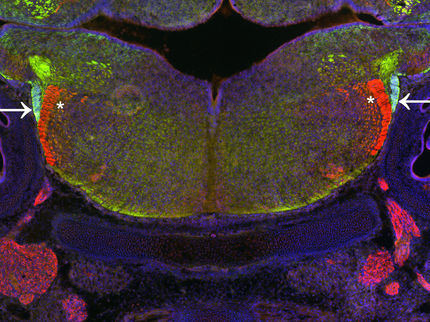New genetic marker makes fruit fly a better model for the study of neuronal development and human brain disorders
Advertisement
VIB researchers attached to the K.U.Leuven have improved the fruit fly as a model for studying the connections between brain cells. The researchers developed a specific marker for a part of the fly's nerve cell which had previously been difficult to distinguish. Their discovery will not only contribute to gaining a better insight into brain development but also makes the fruit fly into a better model system for studying brain development and brain disorders.
The fruit fly, Drosophila melanogaster, is an important, low-cost model organism with 60% genetic similarity with humans. The fruit fly plays a significant role in clarifying various neurological processes such as the way our memory works and our sense of smell and in studying particular neurodegenerative diseases. The team headed by Bassem Hassan uses the fruit fly as a model to study brain development.
Though Drosophila has long been used to study the connections between nerve cells, one specific marker was still missing. To understand the whole circuit between nerve cells, markers are needed for the different compartments of nerve cells (presynaptic or output cells and postsynaptic or input cells).
Under the direction of Bassem Hassan and in collaboration with Wim Annaert, Laura Nicolaï, Ariane Ramaekers and their colleagues have identified the missing marker, DenMark (Dendritic Marker), a hybrid of a mouse protein and a fluorescent protein. The high specificity of such a marker for the input compartment of the nerve cells in Drosophila gives rise to hope that it can also be used in other model organisms.
Original publication: Nicolaï et al.; "Genetically encoded dendritic marker sheds light on neuronal connectivity in Drosophila"; PNAS 2010.
Other news from the department science

Get the life science industry in your inbox
By submitting this form you agree that LUMITOS AG will send you the newsletter(s) selected above by email. Your data will not be passed on to third parties. Your data will be stored and processed in accordance with our data protection regulations. LUMITOS may contact you by email for the purpose of advertising or market and opinion surveys. You can revoke your consent at any time without giving reasons to LUMITOS AG, Ernst-Augustin-Str. 2, 12489 Berlin, Germany or by e-mail at revoke@lumitos.com with effect for the future. In addition, each email contains a link to unsubscribe from the corresponding newsletter.


























































